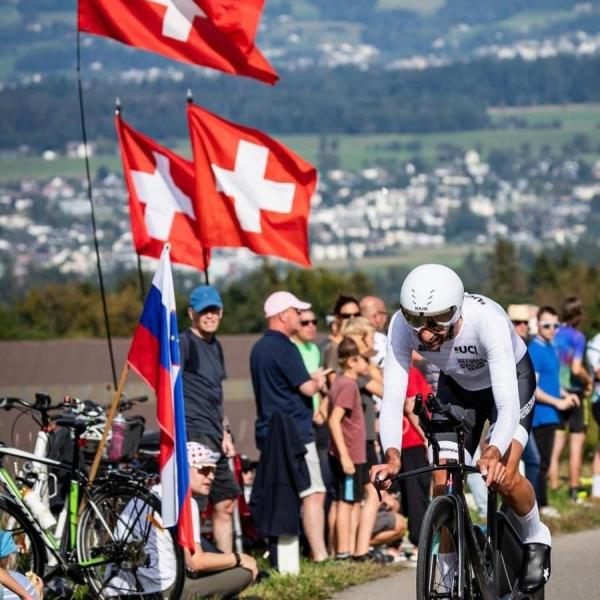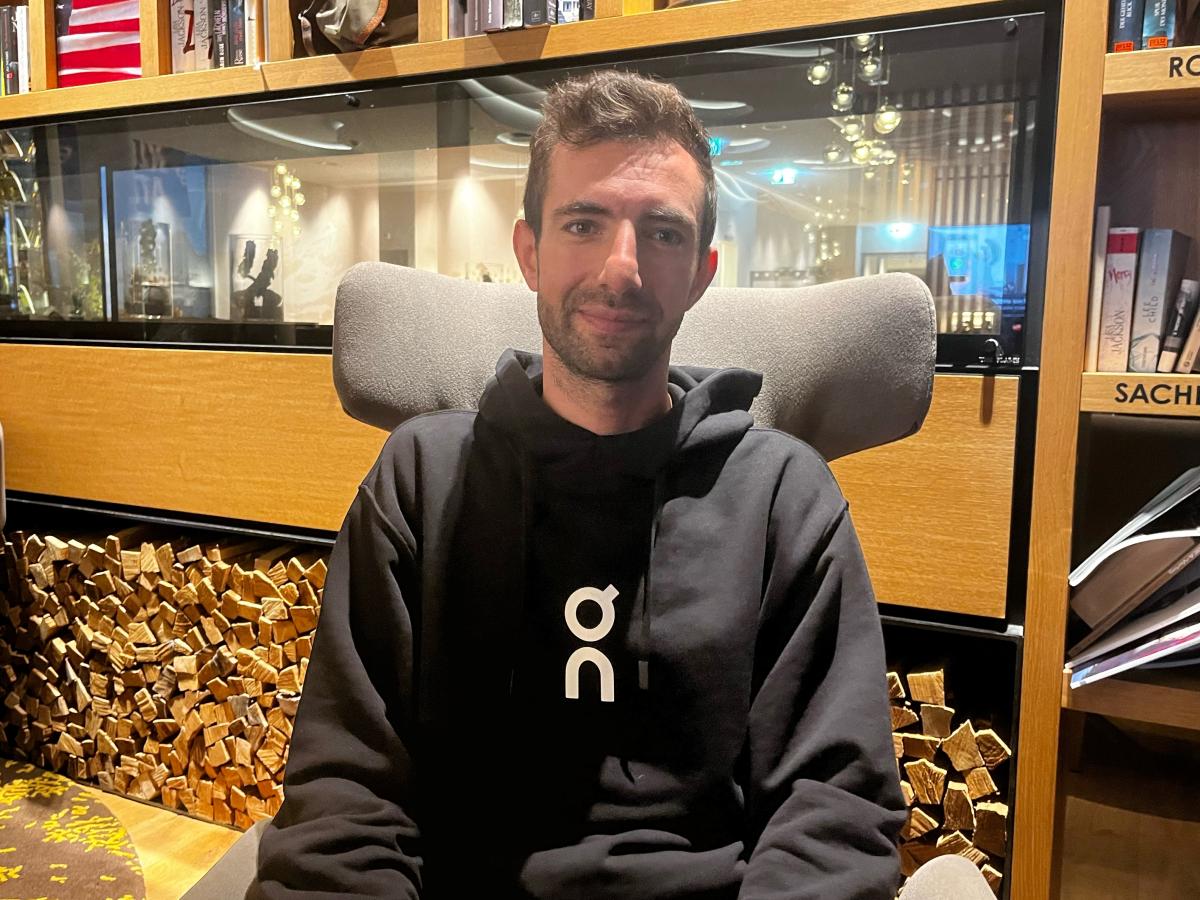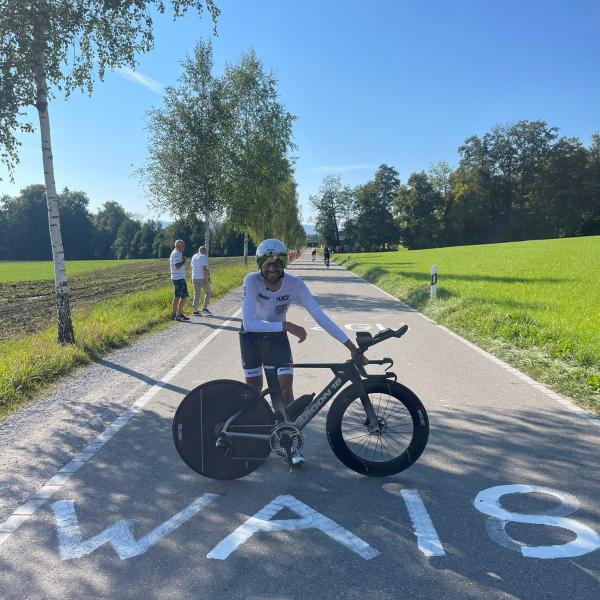The UCI (International Cycling Union) Cycling and Para-Cycling World Championships took place in Zurich in September. The world's best cyclists competed for a place on the podium in various disciplines. Among them was Ahmad Badreddin Wais. The 33-year-old is part of the UCI's refugee team. The fact that he can now compete with the best in individual time trials and road races is still a dream come true for him. Ten years ago, Badreddin had to flee Syria, and after a veritable odyssey, he finally ended up in Switzerland. We were able to visit him in his hotel in Kloten during the World Cup, where he told us his moving story in almost perfect Swiss German with a slight Bernese accent.

Badreddin, congratulations on your participation in the World Cycling Championships. Are you happy with your results?
I am very happy and proud. My goal was to go all out and I did that. I was also very emotional, because it means a lot to me to be able to ride in a World Championship in my second home country.
How did you get into cycling in the first place?
I have two older brothers and they liked to ride their bikes a lot - very fast too, which always led to discussions in the family (laughs). But it fascinated me and that's why I wanted to ride a bike. However, in Aleppo, where I grew up, it wasn't a popular sport. There are hardly any cycle paths there either, so it's quite dangerous, which my parents didn't like at all, of course. But I persevered, and by the time I was 17 I was on the Syrian national team. I won all the prizes in my country, took part in the Arab championships and was the first Syrian to ride in a junior world championship.
I graduated, but suddenly all the universities had to close
Then the war started in 2011 and changed everything...
Yes, I still had hope at first. I was studying sports science in the capital Damascus at the time. I still had a year to go until I graduated, but suddenly all the universities had to close. I was also drafted into the army, but I didn't want to fight in this war. So I decided to flee in 2014. Some of my family were already in Turkey anyway, so I travelled there via Beirut in Lebanon. But I wasn't safe in Turkey either, because there are people there who are on the lookout for military refuseniks like me. So I wanted to travel on to Greece, which was only possible by smuggler boat across the Mediterranean.
That brings back the images we see in the media almost every day: These nutshells crammed full of people.
It's really terrible. I only had a rucksack with me, I was completely hopeless. All my savings went on this trip, but I had no other choice. I spent three nights in a forest with other refugees, we had to wait until the police had gone. Then we got on the boat. There were also children and older people. Many saw this escape as their last chance in life. I wouldn't wish such a journey on anyone.

I had no idea what it actually meant to be a refugee or an asylum seeker.
What happened next in Greece?
I stayed in Athens for two months, I was lucky, I had friends there that I could live with. But Greece was in an economic crisis, there weren't many options for me there. I was just 23 years old, I really just wanted to go cycling again. I decided to try it in the Netherlands or Belgium, the home country of cycle racing. I managed to book a flight to Geneva with false papers. I thought I could travel on from there by train. But when I got off the plane in Geneva in 2015 and saw Lake Geneva, I thought: Wow, how beautiful it is here! And training in the Swiss mountains certainly makes me stronger. What's more, the UCI has its headquarters in Aigle. So I decided to stay and ended up staying with a friend who lives near Lausanne.
You seem to have a lot of friends all over the world!
Yes, I got to know them all through sport, we always kept in touch via social media.
And what happened next?
I had no idea what it actually meant to be a refugee or an asylum seeker. My friend in Lausanne referred me to the federal asylum centre in Vallorbe. I went there, but they sent me on to Altstätten in the canton of St. Gallen because they were already full. I was finally accepted into the asylum procedure there and lived in an asylum centre in Morschach in the canton of Schwyz. I stayed there for a whole year and had to wait. That was a very difficult time for me. You're not allowed to do anything as long as the procedure is still pending. I taught myself some German and finally started cycling again. Yes, even the bike was given to me by friends (laughs). I travelled around Switzerland so much, got to know a lot of people and the local culture, it was like therapy for me.
And the first thing I did was sign up for an intensive course at a German school. I told myself that if I really wanted to stay here, I had to know the language.

Then you finally received a positive asylum decision.
And the first thing I did was sign up for an intensive course at a German school. I told myself that if I really wanted to stay here, I had to know the language. When I finished the course, I started working in a bike shop and continued to train alongside it.
And finally you became successful again.
Even as a teenager, I dreamed of the Tour de France and the Olympic Games. So I decided it was time for me to race internationally again. But as a refugee, it's not so easy to get the necessary support. So I turned to the IOC, the International Olympic Committee. And they said we have a refugee team, come and join us! I'm very grateful for that, they supported me with training, equipment, etc. And so I was able to travel to the 2021 Olympic Games in Tokyo. I wasn't there this year in Paris, but I hope to maybe make it to the next Olympic Games again. Let's see, I'm already 33 years old (laughs). But long careers are actually possible in cycle racing.
We'll keep our fingers crossed! Badreddin, you now live in Burgdorf in the canton of Bern. What does your everyday life look like?
I work part-time as a running consultant in the city of Bern, where I support athletes. The rest of the time I'm out and about on my bike. The canton of Bern is ideal for me. I'm not too far from France, where I often race. And the Seeland, Jura and Emmental are very good places to train.
You still have family in Syria.
Yes, my mum still lives there, for example. I haven't seen her for 10 years, which is very difficult for both of us. Of course she also wants to leave, but it's not possible at the moment, the situation is just too dangerous. I've tried to bring her to Switzerland, but family reunification is practically impossible. I myself can't travel to Syria either because I refused to join the military and would be arrested immediately.
What advice would you give to other refugees?
I would recommend that the first thing is to really learn the language of the new community. That helps with integration. The same goes for sport, it connects you and brings you into contact with other people. I am very grateful to cycling, it has really helped me a lot to get to where I am now.
And what advice would you give to people in Switzerland on how they can best help refugees to integrate?
They should approach refugees more, talk to them and help them to understand Swiss culture. Many people who come to Switzerland for the first time are a bit ashamed if they don't really speak the language well yet and therefore tend to withdraw. But we should simply encourage them to speak and show them that we are interested in them and their history.
Thank you very much for the interview, Badreddin. We wish you continued success for the future!
The war in Syria has been going on for 13 years already. The displaced people urgently need our help – especially now with the winter arriving and the temperatures dropping.